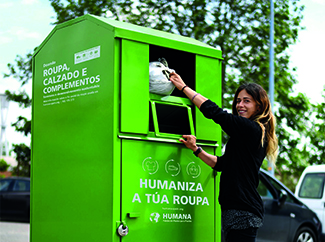consent_cookie
Duración: 1 year
Stores the user's cookie consent state
07-11-2025
After 25 years in Galicia as a used textile manager, Humana has decided to put an end to its activity in this autonomous community. ‘The reserve of the main tenders carried out in recent years makes our work unsustainable,’ say sources at the organisation.
This decision means the closure of the branch, i.e. the closure of the Santiago de Compostela transfer plant before the end of the year and the loss of 10 jobs. Last year, Humana recovered 1,207 tonnes of used textiles in 35 municipalities.
The organisation's decision was announced yesterday by Humana's Director of Projects and External Relations, Rafael Mas, during the III Conference on Local Circular Economy in Santiago. "We are forced to leave a land where we have provided services for 25 years. We are ceasing to collect and manage more than 1,200 tonnes of used clothing per year, and, most painfully, we must lay off a dozen workers, some of whom have been with us for more than 25 years,' he said, adding: ’The situation is very serious in Galicia. It is just as serious in the rest of Spain, especially in Catalonia and the Basque Country."
The reason for this decision is the misinterpretation of Law 7/22 on Waste and Contaminated Soil for a Circular Economy, which regulates textile waste management in Spain. Additional provision 19 stipulates that when a public administration puts this service out to tender, it must reserve at least 50% for social integration companies and special employment centres.
The root of the problem is the application of the reservation
‘The problem is not that the law provides for it, but how it is applied,’ Mas explains. "In most cases, the reservation is automatically applied to these companies at 100%, without prior market analysis or sufficient justification, turning a tool for inclusion into an instrument of exclusion. And it does not allow other entities to bid for the contract. We simply cannot access it. What was supposed to compensate for structural disadvantages has ended up reinforcing dominant positions."
"Since the publication of Law 7/2022, reserved tenders in Galicia have meant that the reservation of 100% is applied to municipalities with larger populations, where the clothing is of higher quality and the cost of collecting it is lower. And what is happening here is not an isolated case; it is being repeated to a greater or lesser extent in other parts of Spain," he insists.
This has been the case, for example, in the exclusive tenders or agreements of the councils of A Coruña, Santiago de Compostela, Pontevedra, Consorcio As Mariñas, Vigo, Ourense and Ferrol.
‘This additional provision was intended to favour integration entities facing competitive difficulties and promote the integration into the labour market of people at risk of exclusion,’ he continues, ‘however, in practice, it is having the opposite effect: it has distorted the market and consolidated an oligopoly that is driving out operators with experience, solvency and a proven track record in textile waste management.’
‘The social purpose of the reserve is not in question. Integration entities perform a fundamental task and deserve real recognition. But when a measure designed to balance opportunities becomes a barrier that prevents other actors from participating, it ceases to fulfil its function and generates perverse effects. The result is a market that is increasingly less diverse, less competitive, more concentrated and, therefore, less efficient,’ he assesses.
An unbalanced legislative measure
‘Just when the sector needs more competition, more efficiency and more diversity of operators, a system is being implemented that reduces competition and encourages dependence.’ He denounces the fact that "the organisations that benefit from the reserve are demanding additional public funding to cover their costs, which amounts to a double privilege: market exclusivity and economic subsidies. If management is deficient and requires constant support, the problem is not competition, but the model."
Humana regrets ‘a misunderstood market reserve, making public tenders a closed shop for integration through 100% reserved competitions’.
Humana defends job placement as an essential value and recognises the social role of the entities that promote it. However, it points out that public policies must be applied with ‘proportionality, balance and an overall vision’. ‘A measure born of good intentions is opportunities and competitivity,’ it asserts.
Following this restructuring, Humana maintains a network of 5,000 containers and its ordinary activity in the rest of Spain.
RELATED NEWS
Opinion piece. When market reservation becomes a barrier: the case of textile waste


